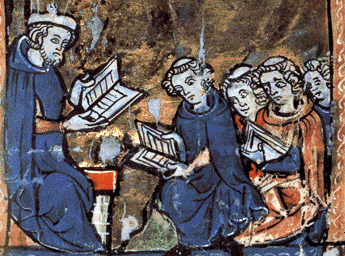Lausavísur §
Edited by Russell Poole
dróttin ‘lord’
dróttinn (noun m.; °dróttins, dat. dróttni (drottini [$1049$]); dróttnar): lord, master
Closean ‘before’
[2] fyrra an ‘before’: Fyrra is a comp. adj., hence einn dróttin fyrra an þik is lit. ‘one earlier lord than you’.
Closefyrra ‘’
1. fyrri (adj. comp.; °superl. fyrstr): first
[2] fyrra an ‘before’: Fyrra is a comp. adj., hence einn dróttin fyrra an þik is lit. ‘one earlier lord than you’.
Closebellir ‘presses’
1. bella (verb; °præt. sg. ball): deal with
[3] bellir ‘presses’: This is the weak verb bella ‘to deal, display, use’, which most often takes an object (in the dat.) referring to negative entities such as treachery or force; the strong bella normally means ‘hurt, harm, affect’, with dat. of the person affected (CVC, Fritzner, AEW: bella; also NN §2218A). The present instance seems to combine aspects of both usages. There is no explicit object, but from the context, including mér ‘for myself’ in l. 4 and the second reference to elli ‘old age’ in l. 8, it is clear that the skald has his own advancing age in mind.
Closebragingr ‘’
Closebiðkat ‘I do not ask’
Closetrýr ‘’
Closetveim ‘two’
[6] lékk aldri tveim skjǫldum ‘I never played with two shields’: The line apparently contains an idiom leika tveim skjǫldum ‘play with two shields’ denoting duplicity (cf. Am 74/8), perhaps based on the idea of swiftly exchanging one shield for another (LP: 3. leika 2).
Closeskjǫldum ‘shields’
skjǫldr (noun m.; °skjaldar/skildar, dat. skildi; skildir, acc. skjǫldu): shield
[6] lékk aldri tveim skjǫldum ‘I never played with two shields’: The line apparently contains an idiom leika tveim skjǫldum ‘play with two shields’ denoting duplicity (cf. Am 74/8), perhaps based on the idea of swiftly exchanging one shield for another (LP: 3. leika 2).
Closeleik ‘’
Closelékk ‘played’
[6] lékk aldri tveim skjǫldum ‘I never played with two shields’: The line apparently contains an idiom leika tveim skjǫldum ‘play with two shields’ denoting duplicity (cf. Am 74/8), perhaps based on the idea of swiftly exchanging one shield for another (LP: 3. leika 2).
Closealdri ‘never’
[6] lékk aldri tveim skjǫldum ‘I never played with two shields’: The line apparently contains an idiom leika tveim skjǫldum ‘play with two shields’ denoting duplicity (cf. Am 74/8), perhaps based on the idea of swiftly exchanging one shield for another (LP: 3. leika 2).
Closefyllik ‘I fill up’
[7] fyllik flokk þinn, stillir ‘I fill up your following, ruler’: Sentiments declaring or reaffirming loyalty may have been a skaldic commonplace (cf. Sigv Lv 3).
Closeflokk ‘following’
flokkr (noun m.): group, flock
[7] fyllik flokk þinn, stillir ‘I fill up your following, ruler’: Sentiments declaring or reaffirming loyalty may have been a skaldic commonplace (cf. Sigv Lv 3).
Closeþinn ‘your’
þinn (pron.; °f. þín, n. þitt): your
[7] fyllik flokk þinn, stillir ‘I fill up your following, ruler’: Sentiments declaring or reaffirming loyalty may have been a skaldic commonplace (cf. Sigv Lv 3).
Closestillir ‘ruler’
[7] fyllik flokk þinn, stillir ‘I fill up your following, ruler’: Sentiments declaring or reaffirming loyalty may have been a skaldic commonplace (cf. Sigv Lv 3).
Closefellsk ‘’
Closehendr ‘’
hǫnd (noun f.; °handar, dat. hendi; hendr (hendir StatPáll³ 752¹²)): hand
[8] á hendr mér ‘on me’: More literally, ‘on my hands/arms’.
Closemér ‘me’
ek (pron.; °mín, dat. mér, acc. mik): I, me
[8] á hendr mér ‘on me’: More literally, ‘on my hands/arms’.
CloseTeaching text: text section
Here you can see a piece of text. Clicking on words in the text will show you the dictionary headword, grammatical information and notes on how the word is used.
You should pay careful attention to the explanation of each word. You can test your knowledge using the translation and other exercises.
In some cases there may be audio of a modern Icelandic rendition of the text on this page.
